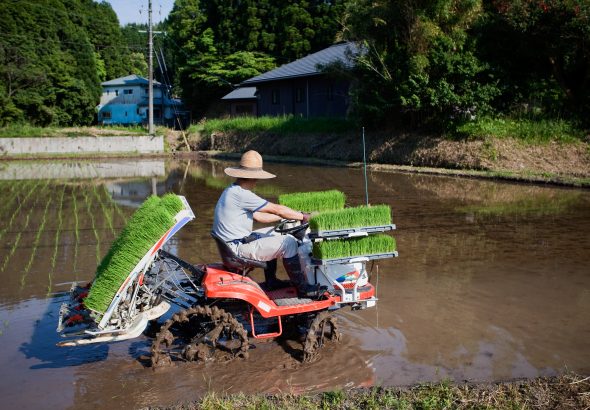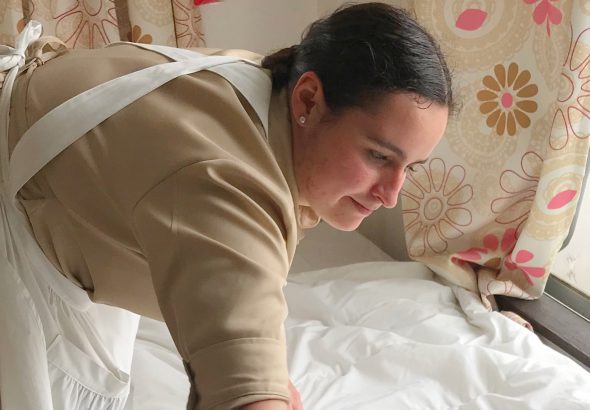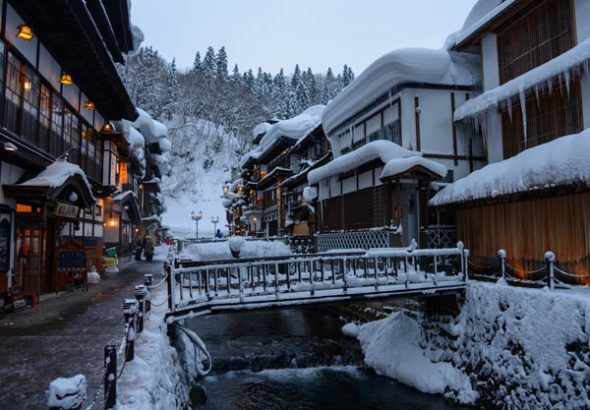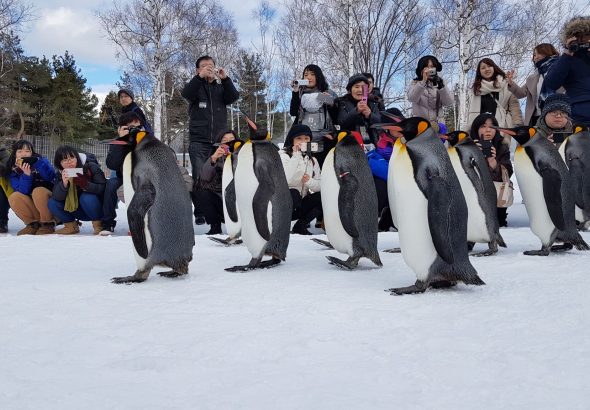Daily Archives: May 22, 2018
- all
- Pop Culture
- Preparation
- Time in Japan
- Tokyo Things To Do
- Travelling
- Working

Have you ever considered traveling to Japan to do farm work? If you are interested in learning, enjoying, experiencing and having fun, this can be a perfect opportunity for you. For many Japanese people, good food quality is of great importance, as well as knowing the origin of the food. With a job on a farm, you will be learning about these aspects. Furthermore, you can have the experience of living with a family at a farm and thereby also learn about the Japanese culture. A job at a farm can be pre-arranged by World Unite!, and it is possible for you to choose if you prefer working on a big farm, or a smaller farm. These jobs do not require previous farm-work knowledge, but it does require a conversational level of the Japanese language. If you do not know a word of Japanese, or if you don't have the confidence to speak Japanese, there is still no need to worry! You will have the chance to join a language course before you start working. During this language course, you will get to know as much Japanese as you wish and have time for, and you can expect to improve your newly acquired language skills even further once you start interacting with the farm workers at your new workplace. So, what kind of work will you be doing? There are different options you can choose from, and your tasks can include: Working with horses, cows, or chickens. Your tasks can be feeding, cleaning, milking, cleaning the stables etc. Growing cut flowers and ornamental plants Seeding, growing and harvesting crops. These could include millet, corn or wheat Planting fruits and vegetables, harvesting, and processing For your work, the average salary ranges between 690-1500 Yen per hour. The farm work jobs are full-time jobs, where you can expect to work 5-6 days per week, with an average working day of 7-9 hours. How, and where will you live? You will be accommodated at the farm where you work, and your meals are offered here too. The costs of accommodation and meals will be deducted from your salary, but since those costs are low you will still have enough salary left to save some money every month. The kinds of accommodation and meal opportunities that you will have differ according to the farm you will be living at, but we will suggest farms according to your preferences: With a farmer family or at a farm staff accommodation In a single room or in a dorm room Your meals may be cooked and ready to eat, or you may get raw food items that you can cook for yourself Do You Want to Know More? Does this sound interesting, and would you like to know more? Then visit our webpage at http://www.world-unite.de/en/working-holiday/japan/farm-work-jobs-in-japan.html

We have visited Katrin H. (20) at her workplace at a hotel in Ginza, Tokyo's posh area. Katrin is doing a Working Holiday in Japan and works at a housekeeping job – so if a bed has to be made with speed - Katrin is the one to come to the rescue! The hotel is very clean and welcoming, and you will meet a helpful and friendly staff. Katrin, what made you decide to travel to Japan to work? It is actually quite a long story because the first time I came in contact with the Japanese culture was all the way back in primary school through my friend. Ever since meeting her, I kept on really appreciating the Japanese culture. Then, after my high school graduation, I didn’t want to start university right away. So I just thought, okay, this would maybe be my last chance to come to Japan for more than just a vacation and experience the culture. So I went, and here I am! How did you find the job at the hotel in Ginza? I got it through the internet because the other job introductions that I got through “HelloWork” (employment agency) didn’t have any available jobs at that moment. So I searched online, and then I found another agency similar to “HelloWork”, only for hotels. I applied, and they immediately wrote me back that they had some hotels that were searching like crazy for people. I went there, got an interview, and then I heard I got the job the next day! For how long are you planning to work at the hotel? I started to work at the hotel in October 2017 and I will quit in May 2018, because I am planning to travel to Kyoto, Osaka and Nara. After that, it is time to go back to Germany. What does a typical workday look like for you? Every single day I go to work during the rush hour – like many other people! Except for Saturday and Sunday because that is my weekend. When I get to the hotel, I change into my uniform and then wait a little bit until everything is prepared by my boss. I then search for my name on the hotel whiteboard in order to see which floor I am going to be working at. After that, I take the paper with my name and the rooms on it, I get my keycard, and go to my floor and make the beds for 6 hours. After that I'm finished, and once my supervisor has approved my work, I change back to my own clothes and go back home. What kind of demands come with your job? You should speak a little bit of Japanese, because there are some guests who want to talk to you, for example, because they don’t know how to turn on the TV, or they ask you other questions. So a little bit of Japanese is really, really helpful. I don’t think there is anything else actually. Just to be able to work normally and to be physically healthy, and speak a little bit Japanese so you can interact with the guests and with the boss. How much do you earn, and is it enough to cover your living expenses? I think, if I work full-time like I would do in Germany, I think I would get 120.000 yen per month plus travel expenses which the hotel covers. I can live off that and still save money for later for my travel, so it is really good. Do you enjoy your job? It is really stressful sometimes, but it is great. It is really great, because you get to know different people. I don’t think we have any Japanese person working in our hotel, besides our boss, but you learn to interact with each other. The others at my job usually know some Japanese and their mother tongue, so it is just like, okay! I don’t know what you say! So you have to speak Japanese to understand your co-workers as well. Also, you really feel great after a guest comes to tell you that they had a good stay, then you feel that you have done a good job. It was really stressful, but it makes you smile. Are there certain aspects of your job that you do not like? Yes, I don’t think there is any job that only has positive aspects. But sometimes I feel like the hotel’s rules for cleanliness can be stressful. Everything has to be very perfectly cleaned, so at times, it feels like they are a bit too strict. Do you think that working at the hotel helps you in improving your Japanese? Yes, a lot. It has really helped because most of the guests are Japanese, and you need to interact with them. You can speak English, and some of the guests try to speak to you in English because they see that you are a foreigner and think that you cannot understand Japanese. But I can actually speak Japanese, so there are no worries there! And every time I say that I can speak Japanese, they feel relieved, because they can interact with me, and that is really great and really helpful for me as well. I learn many new words, and it helps me to use my grammar in the correct way. It is really helpful. I also learned how to make beds really fast! And how to clean toilets and bathrooms in general. I think it is really helpful, but maybe not that helpful in Germany. But it is a great experience and I like my co-workers, so it is great there. My co-workers can be divided into 2 groups: Chinese and Filipinas, and then I am the European in the middle. There are no others – just my boss who is Japanese. So we cannot communicate in English. My Chinese co-workers can’t really speak English and the Filipinas and my boss can speak English, but the only way for all of us to understand each other is to speak Japanese. When we have meetings, for example in order to improve our work, or to handle customer complains, then everything is in Japanese. And because some of the Filipinas cannot speak Japanese that well, the shift manager has to translate it into Tagalog, and then there is another co-worker who is Chinese/Japanese who translates into Chinese to the Chinese employers. So there is a lot of translation going on, and you can hear a few words here and there! For me, if I don’t understand something, then I can just ask my shift manager, and then she can tell me what the meeting was about once more in English. But all in all, I can just say that I think it is a really nice job!

Have you ever heard of a ryokan? A ryokan is a traditional Japanese hotel, and by doing a working holiday in Japan, you can get the opportunity to work in a ryokan where you will learn about traditional Japanese culture, culinary arts, service of the highest level, and much more. Ryokans are very high standard hotels, and they are visited by Japanese as well as foreign tourists. There are usually around 14 rooms in a ryokan, and the rooms are traditionally designed, with no furniture apart from a low table which is used to serve breakfast on. For sleeping, the guests get tatami mats, and the bathing facilities are often large shared bathing areas, fed by hot volcanic springs called onsen. A job at a ryokan can be pre-arranged by World Unite!, but in order to get a job, you need to have a conversational level of the Japanese language. If you do not know Japanese, you are much welcome to join a language course, where you can expect to gain the necessary language skills after attending classes for 1 month. So, what kind of work will you be doing? There are different work tasks, which will include: Housekeeping Preparation of futons Dishwashing and kitchen assistance Preparation of tables and serving food Cleaning the onsen area For this work, the average salary ranges between 690-1500 Yen per hour. The Ryokan jobs are full-time jobs, where you can expect to work 5-6 days per week, with an average of 7- 9 hours of work per day. How, and where will you live? Most often, the ryokans arrange your accommodation, and this can be different according to the ryokan you will work at. Your costs for accommodation and meals will be deducted from your salary, but since these costs are low you will still have enough salary left to save some money every month. Different accommodation options include: Single or dorm room in a staff housing facility near the ryokan Accommodation further away from the ryokan, transportation will be arranged Meals provided at the ryokan Do You Want to Know More? Does this sound interesting, and would you like to know more? Then visit our webpage at http://www.world-unite.de/en/working-holiday/japan/ryokan-jobs-traditional-restaurant-hotel.html

To many people, foreign tourists as well as Japanese locals, Hokkaido's image is one of low temperatures and snowy mountains. It's no wonder most people go to Japan's northernmost island for winter sports. However, this amazing place has so much more to discover than just skiing down a mountain! I already visited the landscape in summer of 2009, and this time I wanted to see it during winter as the weather during summertime is a bit similar to Germany. But unlike Germany, Hokkaido turns into a snowy wonderland during the winter. If you are in Japan for a working holiday, do yourself a favor and make sure to spend a week or so at Japan's prime winter sports destination! Sapporo This year I spent around one month in Hokkaido. I decided to set up my freelance headquarters in Sapporo because the capital city has the best connection to the public transportation. Another aspect is that most of my friends are living in or near Sapporo. During the first weeks I explored Sapporo and its vicinity. As Sapporo is not a sprawling city, you can reach many spots within an hour of walking, so I walked to the Okurayama Ski Jump Stadium when a Ski Jumping event was going on. I never saw this sport before, and it was so amazing to see the competitors flying! If there is no event going on you can watch a training if you are lucky. Next to the stadium, there is a winter sports museum. Unfortunately it turned out to be closed in January, but when I visited Sapporo in 2009 it was open and I recommend you stop by. The best part of the musuem is that you can practice different winter sports with simulators, it's almost like being on the slopes for real! Other interesting spots you shouldn't miss when you are in Sapporo were the Sapporo Clock Tower where you can explore the history of the city, the Susukino nightlife district, and Mount Moiwa. When I went up this mountain using two ropeways, I was stunned by one of the most beautiful views of the city and the ocean from the top. Penguins in Asahikawa In the begin of February I went to visit a friend in Asahikawa. Because I stayed with his family, I got the chance to see from up close how a Japanese family lives in Hokkaido. My friend and I visited popular spots in the city, like the science museum and the zoo. The zoo of Asahikawa is quite a famous place in Hokkaido. It is not big, but the highlights are the nice arranged habitats and the penguin walk, where a group of penguins walks through the public area as seen in the picture. The renowned Asahikawa Yuki Matsuri (Asahikawa Snow Festival) is also a must-see. You will see snow sculptures along the river, ice slides, and be able to try many delicious kinds of food. I also visited the judo club of my friend's sister and watched the class practice. At the gym we met the class teacher of my friend, and he invited me to come to the high school the next day. I was really excited to get the chance to see a Japanese high school from the inside! The students were really amazed to see me, a foreigner, in their school. During English class, I assisted the teacher by helping the students while they prepared a group speech. After class finished, the teacher guided me around the school. This experience was a unique moment I will remember for sure! During my stay, the Sapporo Yuki Matsuri (Sapporo Snow Festival) also happened to be in full swing. I even arrived in time to see how artists built up their ice sculptures. After the event kicked off, the city was full of gigantic snow walls with pictures and ice sculptures lit up in every color. For the last week of my stay I visited several places. First on the list was visited Obihiro. I am a horse lover, so my main reason for visiting this city was the horse racing stadium, which is unique in the world. Here you can see how one of the mightiest horse breeds in the world is running on a special racetrack. Bannei horses are not cantering through the track like they do during a normal race, but they are pulling a heavy sled over 2 hills. It was very special to me to be able to watch this spectacle. Hot Springs, Bears and Drift Ice The next city on my list was Noboribetsu, which is popular for its hot springs, old city with people in ninja costumes, and bear park. In the bear park, you can see brown bears doing funny tricks to get attention and food from visitors. When I took a short walk through the city something that stood out were the many statues of Oni (demons) along the way. There is a place near the city named Jigokudani, also known as 'hell valley', hence the statues. It is a spectacular place with hot steam vents, sulfurous streams and other volcanic activity. It is from this valley where most of the onsen in the vicinity get their hot spring water. At last I went to the eastern part of Hokkaido. My first stop was Kushiro, which is famous for its wild nature and Japanese cranes. In the evening I took the train to Abashiri and stayed here for one night because it would be an early wake-up call the next day for a boat trip to see the drift ice. On an icebreaker, we went for a one-hour tour through the bay and the drifting ice, which I already saw from the train one day before. We were also lucky to see Stellerˋs sea eagles next to the boat. It was a great end to a trip to remember! About the author Michaela has been interested in Japan since she was young, and aged 25 she decided to go on a Working Holiday to the country that has always felt like a second home to her. Feeling safer by going to Japan through an organization, having the back-up of World Unite! turned out to be a good investment. Michaela found some great jobs during her stay on a Working Holiday visa (one job was scuba diving assistant!), and she also took the opportunity to travel around many areas of Japan. In the end, Hokkaido turned out to be my favorite place, as here you can find a great mix of nature and city.
